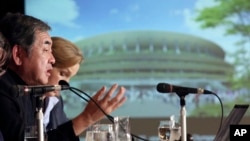Kengo Kuma, the architect of Japan's new 2020 Olympics stadium, refuted allegations Friday by British-Iraqi designer Zaha Hadid that his design borrowed from blueprints she made that organizers dropped last year.
“In the design, I would like to say there are no similarities at all,” Kuma told reporters when asked about complaints by London-based Zaha Hadid Architects over apparent similarities between her design and Kuma's.
Kuma noted, however, that both architects had to meet strict specifications for the new, 80,000-seat structure in downtown Tokyo that will replace Japan's old National Stadium.
“The conditions set for the competition mean that automatically some similarities emerge,” he said. He added that “the concept is completely different, so it is absolutely a different building, despite the similarities.”
Hadid's company said Thursday that the Japan Sport Council was withholding money owed for work on the 2020 Tokyo stadium design, while demanding her company give up claims to copyrights.
After her original design was rejected as too costly, Hadid complained the new design chosen by the sport council, made by Kuma in collaboration with two companies that earlier worked with her team, was similar.
Her office said it submitted a report to the sport council detailing the similarities in “the structure, layout and numerous elements” between her design and the newly picked one replacing hers, demanding copyright negotiations.
Kuma said he could not comment on those discussions.
He said he did not think that the Japan Sport Council had decided against working with Hadid because she was a foreigner, though working in Japan as a non-Japanese might be challenging.
“I don't know, as I've never worked as a foreigner here,” he said. “But from my own personal point of view, communicating and holding meetings might be difficult.
“Japan needs to work harder to really open its doors to make it a more welcoming environment for people from other countries to work in,” Kuma said.




